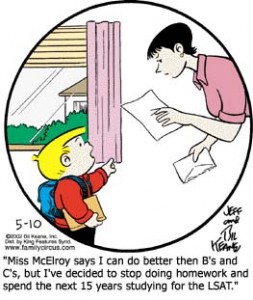Since the delayed release of the October LSAT scores following Hurricane Sandy – as if anyone needed any further suspense and build-up – I have spoken to many students in the past week about their scores and its impact (or more accurately, their perception of its impact) on their law school aspirations. With that in mind, I thought it timely to repost a blog I wrote about this very topic two years ago to help settle nerves and provide some grounding and perspective about this particular component of the law school application process. My hope is that it does just that… and that it allows you to now get back to finishing up those applications!
The LSAT exam is one of the most anxiety-inducing aspects of the law school admissions process, sending even the most calm and reasonable applicants into a tailspin of self-doubt and irrationality. In fact, if I had a dollar for every time I heard one of the following statements uttered in my office – “I know that the LSAT is the only thing Admissions Committees care about” or “If I don’t get a [insert absurdly high LSAT score here], I know I don’t have a chance at being admitted to any “good” law schools” – well, let’s just say that I could be writing this blog entry from a café in Paris.
(c) King Features Syndicate
As a former law school admissions officer, and one of Penn’s pre-law advisors, I have more than six years of experience witnessing the range of reactions associated with “getting back the score.” Usually though, these reactions fall into three distinct categories: (1) unqualified joy and relief, (2) utter devastation and panic, or (3) frustration and bewilderment. Let me try to explain why all of these reactions are at least somewhat (to very) misguided.
1. Unqualified joy and relief…. or the “Now I Have Nothing To Worry About” Misconception. While nobody, myself included, is going to tell you that your LSAT score is unimportant or a non-issue, it is almost never the deal-breaker… or, in this case, deal-maker… that applicants believe it to be. The fact is, an LSAT score is the single-best predictor of first-year law school performance. Let me repeat that: An LSAT score is the single-best predictor of first-year law school performance, according to annual LSAC correlation studies on first-year grades in ABA-accredited law schools. However, it is widely known (and widely accepted) that LSAT scores have little definable correlation with second-year or third-year law school performance, selection to Law Review, bar passage rates, post-graduation job offers… and the list goes on. With that in mind, law school admissions officers view LSAT scores as a useful, but limited tool in evaluating their candidates for admission. Sure, if you have a strong LSAT score, coupled with an otherwise strong and attractive application – a rigorous academic curriculum, consistently strong academic performance, a well-crafted and effective personal statement, compelling and detailed letters of recommendation, a history of unfailing extracurricular involvement and leadership, not to mention a host of other factors – then that LSAT score will speak to a candidate with a great deal of potential. If some or most of those other factors are not present though, a high LSAT score in a vacuum will not move mountains. Even worse, Admissions Committees might wonder (and rightly so) why a student with clear intellectual potential based on that high LSAT score was so underwhelming in other areas of life.
2. Utter devastation and panic… or the “Now I Need To Find Another Career” Misconception. If your results of this exam for which you (hopefully) spent a lot of time preparing did not pan out as you had hoped, there is certainly cause for some degree of disappointment. However, in light of what was just discussed, you need to have faith in the fact that law school admissions officers will still read and carefully evaluate your application with equal attention. The truth is, the LSAT is a snapshot of who you are as an applicant – on one day (maybe two days… hopefully, not three days) – and Admissions Committees always review applications in their relative context and in light of every other aspect of your application. I know of no law schools who employ cut-off scores for LSAT performance and, while 25th percentile, median, and 75th percentile information is readily available for any ABA-accredited law school, they are not indicative of the full range of scores of successfully matriculated students. In fact, those numbers speak to the middle 50% of a law school’s incoming class – nothing more, nothing less. Though a lower-than-expected score might result in refining your current list of schools, you do not need to find another career.
3. Frustration and bewilderment… or the “But I Scored A 172 On One Practice Exam Back In August” Misconception. As I have previously stated, taking the LSAT is an anxiety-producing experience. With that in mind, very few students have their best day, score-wise, on the day of the actual exam. The truth is, most students score between 1-3 points lower when they take the LSAT than on their earlier practice tests. While sitting for full practice LSAT exams under “simulated test conditions” is strongly advisable in your preparation, it would be impossible to simulate the actual real-world stress of that particular day. Whether it’s the heightened communal angst of your fellow test-takers… or getting finger-printed for identification… or experiencing a last-minute room change… the pressure of that particular experience is unique and almost always affects your score. And more than likely, it affects your score negatively… usually to the tune of 1-3 points lower than your typical practice exams. The good news? This is a shared experience of anxiety for the majority of test-takers on a curved exam, which in some way actually corrects for this.
To reiterate, it’s only one number… I promise. And yes, I know that you still don’t believe me.


